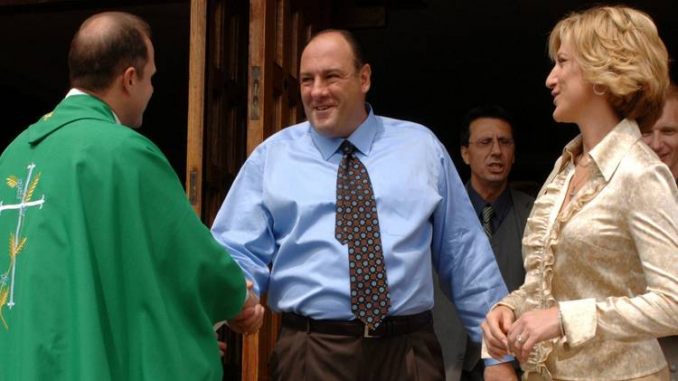
Introduction: The Sopranos’ Enduring Appeal
When The Sopranos first premiered in 1999, it quickly became a cultural touchstone, changing the landscape of television forever. Its compelling portrayal of mob boss Tony Soprano, played by the late James Gandolfini, and its complex characters and storylines redefined what TV could be. Though the show ended in 2007, its legacy has endured—so much so that in 2020, when the world went into lockdown, The Sopranos experienced a remarkable resurgence.
In the age of endless streaming platforms and endless content, many fans—new and old—turned to The Sopranos during the COVID-19 lockdown, leading to a fresh wave of fandom. But what made this show so addictive, and why has it continued to captivate viewers, even years after it ended? In this article, we’ll explore how The Sopranos went from a legendary TV hit to the ultimate pandemic binge, cementing its place in the annals of television history.
The Sopranos’ Legacy: A Game-Changer in TV
Before we dive into its newfound popularity during lockdown, it’s essential to understand what made The Sopranos so groundbreaking when it first aired.
A New Era of TV Storytelling
At its core, The Sopranos was revolutionary in its ability to blend complex storytelling with deep character exploration. The show’s nuanced portrayal of Tony Soprano as a flawed anti-hero paved the way for the “Golden Age” of television. Unlike traditional mob films that focused mainly on crime, The Sopranos explored the personal, familial, and psychological struggles of its characters. Tony was not just a mob boss—he was a man grappling with anxiety, depression, and the pressure of balancing a criminal empire with his family life.

The series broke the mold of episodic TV storytelling, instead opting for an overarching narrative that explored themes like power, loyalty, betrayal, and mental health. It was a major step toward transforming television into a serious medium for storytelling, on par with cinema.
The Sopranos’ Second Life During Lockdown
A Perfect Escape from Reality
During the pandemic lockdown, as millions of people around the world found themselves stuck at home, many turned to old favorites and comfort watches. In a time of social isolation, economic uncertainty, and unprecedented stress, The Sopranos provided an intriguing and immersive escape. The world Tony Soprano inhabited was deeply flawed, but it was also compelling. For many, it was the perfect way to escape their own worries and anxieties.
The show’s character-driven storytelling offered a welcome distraction from the news cycles, and viewers became even more invested in the Soprano family’s dramas. It wasn’t just about the crime and the bloodshed—it was about the characters’ internal struggles, which resonated with people looking for meaning and complexity in their own lives.
Why The Sopranos Took Off During Lockdown: A Blend of Nostalgia and New Discoveries
The Rewatch Factor: Nostalgia and Comfort
For fans who had already seen the series, The Sopranos was the ultimate comfort watch. Like old friends, the characters had an enduring presence in the minds of fans who couldn’t get enough of Tony, Carmela, Paulie, and the rest of the gang. In a world filled with uncertainty, revisiting the world of The Sopranos allowed fans to reconnect with a show that had made a lasting impact.
For others, the lockdown was a chance to discover The Sopranos for the first time. The show had been an enduring favorite for years, but many people had never had the time to binge it from start to finish. With plenty of free time at home, newcomers had the chance to dive into the 86 episodes that made the series legendary. Streaming platforms like HBO Max made it easier than ever to access, and viewers could marathon the entire show without waiting for episodes to air.
The Timelessness of Tony Soprano: A Mob Boss for Modern Times
A Complex Anti-Hero for Today’s World
One of the reasons The Sopranos remains so captivating is its portrayal of Tony Soprano as an anti-hero. In many ways, Tony represented the moral ambiguity that has become a hallmark of modern television. He was a murderer, a liar, and a cheater, yet viewers were drawn to his vulnerability, especially his struggles with mental health. In an era when people were facing their own challenges with isolation, anxiety, and uncertainty, Tony’s battles with depression and his therapy sessions resonated deeply with audiences. His vulnerability allowed viewers to see beyond the violence and chaos of his life.
Even though the show was rooted in a criminal world, it was ultimately about human relationships—family, loyalty, and personal identity. As we all faced existential questions during the pandemic, Tony’s struggles with his dual life as a family man and mob boss became oddly relatable.
The Sopranos and the Rise of Streaming: The Perfect Show for a New Audience
A Resurgence on Streaming Platforms
While The Sopranos had always enjoyed a loyal fanbase, the show’s resurgence during the pandemic was fueled in part by its availability on streaming platforms. With people turning to streaming services for their entertainment needs, shows like The Sopranos became more accessible than ever. HBO Max, which carried the full library of The Sopranos, was a key player in this renewed interest. The ability to binge-watch the series allowed fans to immerse themselves in the world of the Soprano family for hours on end.
The show’s availability on streaming also introduced it to younger audiences who may not have been alive when The Sopranos originally aired. This new generation of viewers embraced the show’s timeless qualities: the intricate character studies, the moral complexity, and the exploration of family dynamics.
The Cultural Relevance of The Sopranos Today
A Reflection of Ongoing Societal Issues
What’s striking about The Sopranos is how relevant it remains, even in the midst of a global pandemic. Its themes of power, control, and the human condition still resonate today, especially as we face challenges of our own. Tony’s struggles with mental health mirrored the widespread anxiety and depression many people experienced during the lockdown. His challenges with balancing his personal life with his professional one reflected the difficulties many faced while trying to juggle work, home life, and personal wellbeing during the pandemic.
At its core, The Sopranos was always about how people cope with their inner demons—whether they’re mob bosses, suburban housewives, or office workers—and in that sense, the show was as relevant during the pandemic as it was when it originally aired.
Conclusion: The Sopranos’ Enduring Legacy
While the world has changed drastically since The Sopranos first aired, the show’s timeless appeal remains stronger than ever. Whether revisiting it for nostalgia or discovering it for the first time during lockdown, The Sopranos offers an in-depth exploration of human complexity that feels both comforting and thought-provoking. Its shift from a cultural phenomenon in the early 2000s to a global binge sensation in 2020 is a testament to its staying power and the incredible storytelling that made it a true landmark in television history.
If the pandemic has shown us anything, it’s that The Sopranos remains a show that resonates deeply, no matter the time or place.
5 Unique FAQs About The Sopranos and its Popularity During Lockdown
1. Why did The Sopranos become so popular again during the lockdown?
The Sopranos’ popularity surged during the lockdown due to its emotional complexity and relatability. As viewers faced anxiety and isolation, the show’s deep exploration of mental health, family, and moral ambiguity made it a perfect escape and comfort.
2. Is The Sopranos still relevant today?
Yes, The Sopranos continues to be relevant today because its themes of power, family, and personal struggles are timeless. The show’s exploration of mental health and human complexity resonates with modern audiences, especially in times of crisis.
3. How did streaming help The Sopranos during the pandemic?
Streaming services like HBO Max made it easier for viewers to binge-watch The Sopranos, introducing the series to a new generation and allowing longtime fans to revisit it.
4. What makes Tony Soprano such a compelling character?
Tony Soprano is compelling because he’s a complex anti-hero. Despite his crimes and flaws, viewers connect with his vulnerability, particularly his struggles with mental health and his attempts to balance family life with his criminal activities.
5. How has The Sopranos influenced modern TV?
The Sopranos set the stage for the modern era of television by introducing nuanced characters, long-form storytelling, and anti-hero protagonists. Its legacy can be seen in shows like Breaking Bad, Mad Men, and The Wire.